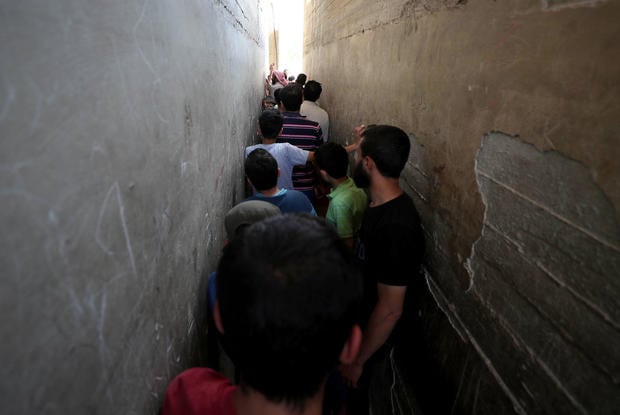For the second time in a week | Institutions of the “Salvation Government” in Idlib reduce the weight of bread packs
Idlib province: SOHR activists have reported that the institutions of the “Salvation Government” in Idlib has reduced the weight of bread packs to 550 grams each, and reduced the number of bread loaves in every pack from seven to six. However, it maintained the price of bread packs at 2.5 Turkish Liras each. This development follows a new Turkish currency plunge against the US dollars, where the Turkish lira has witnessed a sharp fall, recording 9.60 Turkish Liras against US dollar.
It is worth noting that today’s decision comes a week after a similar decision issued by the Salvation Government on October 15, where the weight of a bread pack was reduced from 650 grams to 575 grams, with leaving the price and number of bread loaves unchanged.
On October 19, SOHR activists reported that after the “Salvation Government” had decreased the weight of a pack of bread from 650 grams to 575 grams, clamping down on the residents in areas under its control, “Watad” petroleum company announced a new decision, raising the fuel prices in Idlib province and parts in Aleppo countryside for the second time in a week. The decision comes in light of the astronomically inflated prices of food and stockpiling of essential products by merchants, amid ongoing inaction by the officials and authorities.
According to SOHR sources, the new prices had been set as follows:
- Petrol: 7.71 TL per litre
- Imported oil: 7.61 TL per litre
- Refined oil: 6.45 TL per litre
Moreover, the company decreased the price of a gas cylinder from 114 TL to 108.5 TL, after decreasing its weight as well.
On October 15, SOHR sources reported that dozens protested in al-Sha’ah square in Idlib city under control of the HTS that demanded the Salvation Government to improve their living conditions and services in the province and held the greedy merchants accountable and take them away from the market.
The protesters raised placard reads, “poverty spreads, no for corruption and hiking princes, don’t; play with the people services.” the protests came in response to the poor conditions including unemployment, hiking prices and poverty in Idlib due to the collapse of the Turkish Lira.
As HTS leaders have been controlling the markets, protesters stressed that the Syrian revolution demands that are summarized in the regime fall and the release of protesters.
On the same day, the “Salvation Government” issued a decision reducing the weight of each pack of bread, which contains seven loaves and sold for 2.5 TL, from 650 grams to 575 grams.
This development coincided with the decrease in the exchange rate of the Turkish lira against the US dollar, where the Turkish lira against the US dollar recorded 9.15 TL. Meanwhile, the “Salvation Government” has not changed the price of packs of bread when the Turkish lira, which is used in Idlib, plummeted in the past days.
Idlib residents were struggling with dire living situations due to the high prices following the use of the Turkish Lira as the official currency in the region, where workers got wages of 20 Turkish Liras, equivalent to eight packs of bread with a total weight of 4,600 grams.
Also, on October 13, Observatory sources reported that Warad Company that is controlled by Hayyaat Tahrir al-Sham issued new bulletin of the fuel prices in the HTS-controlled areas for the second time in days. The maximum averages of prices in petrol stations have been set as follows:
- Imported petrol: 7.71 TL per litre
- Imported oil: 7.61 TL per litre
- Refined oil: 4.62 TL per litre
- A gas cylinder: 117 TL instead of 108 TL.
The company justified the rise of prices to the hiking prices of fuel and gas from the exporting side and the increase in the international oil prices and what the Turkish Lira was witnessing from the ongoing collapse over several days.
Civilians in northwest Syria suffered from the deteriorating living conditions due to the hiking prices of all food commodities after fall of the Turkish Lira against the US dollars and the merchants monopoly policies amid absence of any law for protecting the consumer by official bodies.

